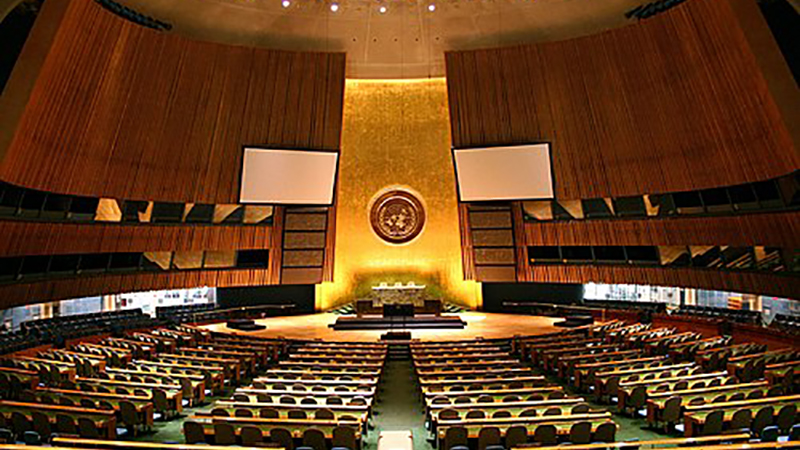
The 80th session of the United Nations General Assembly will begin this week, but many of its 193 member states, particularly in the Global South, find little cause for celebration.
The U.N., created after World War II, was established to promote peace, prevent conflicts and protect future generations from the devastation of war. Despite years of U.N. peacekeeping and diplomacy, many believe the organization is becoming less relevant in a world divided by conflicts and dominated by powerful nations with colonial-era roots.
As the United Nations celebrates its 80th anniversary, it faces challenges from global crises, and criticism over its inaction on the war in Gaza, largely attributed to the veto power of the five permanent members of the Security Council: China, France, Russia, the United Kingdom and the United States.
The UN has faced numerous challenges, including Russian aggression in Ukraine; the Indian occupation of Kashmir; conflicts in Iraq, Libya, Afghanistan, Syria, Gaza, Lebanon, Yemen, Somalia, Sudan and Myanmar; as well as the struggles of the Uyghurs and various issues across Africa and South America.
However, the 23-month-long war in Gaza underscores one of the U.N.’s major failures. Why can’t the U.N. halt Israel offensive? The veto power held by colonial powers plays a pivotal role.
To understand the U.N.’s extensive shortcomings, it’s essential to consider the context of its founding. The organization was officially established in October 1945, following World War II.
The organization operates through two main bodies: the General Assembly and the Security Council. Even though it represents the collective will of its members, its structure creates notable challenges: In the General Assembly, every member gets one vote, but its overall influence remains limited. Most of the real decision-making power lies with the 15-member Security Council. The Security Council’s five permanent members hold veto power, allowing each one of them to reject efforts to enforce international order, resolve disputes and ensure humanitarian resolutions.
It’s questionable why these five nations have the right to dictate global matters. The General Assembly, representing global opinion, should have enforcement powers rather than leaving this authority with the five permanent members of the Security Council, who frequently prioritize the interests of colonial and imperialist powers.
The U.S. plays a major role in U.N. decisions and has often vetoed resolutions against Israel, nearly 50 times since December 2023, according to the Chicago Council on Global Affairs.
These resolutions often seek to address the actions of a repressive occupying regime. Over the last year, Washington has blocked four Security Council resolutions calling for a Gaza ceasefire, highlighting growing global frustration.
The policies of successive U.S. administrations and their backing of Israel have stirred global concerns, drawing attention to the U.N.’s struggles in tackling key issues. The U.N.’s failure to uphold its charter raises doubts about its role as a fair platform for justice.
For nearly 80 years, the UN has not resolved the Palestinian issue. From its beginning, with its partition plan for the region following the end of British control over the region, it caused a major injustice by assigning 56% of the land to Jews. This original injustice persists even today.
The Global South, especially emerging powers Brazil, Russia, India and China, should focus on turning the Shanghai Cooperation Organization into a true alternative to the United Nations.
The Shanghai Cooperation Organization, established in 2001, seeks to promote regional security and stability. Over the years, it has grown to include nine members, with India and Pakistan joining in 2017, Iran in 2023, and Belarus in 2024.
In the last two decades, and especially in recent years, significant developments have shaped the organization. China has solidified its role as a major economic power in Central Asia, while Russia, following its invasion of Ukraine, has shown increased interest in the cooperation offered by the SCO. Looking ahead, there is potential for a more unified SCO and BRICS (Brazil, Russia, India, China and South Africa) alliance, bringing members together to challenge neo-colonial dominance. Although some critics dismiss the SCO, BRICS and the African Union as ineffective or irrelevant, it may be premature to write them off entirely.
The recent Sino-Indian rapprochement, unintentionally prompted by the U.S., explains why China, which hosted this year’s SCO summit, agreed to include it in the Tianjin Declaration, in contrast to its noticeable omission from the late June SCO defense ministers’ draft statement.
Donald Trump has threatened to cut funding to the U.N. and has already withdrawn support from several of its agencies. Maybe it’s time to dismantle the U.N. and let other countries take charge. Under BRIC leadership, member nations could contribute funding based on a percentage of their GDP, with equal voting rights to ensure inclusivity. Brazil or South Africa could host the headquarters. This organization, alongside BRIC members, could deploy troops to counter oppressive powers targeting weaker states or populations, potentially preventing destructive actions in regions like Gaza, Ukraine, Kashmir, and others.
#UnitedNations #GlobalReform #UNat80
